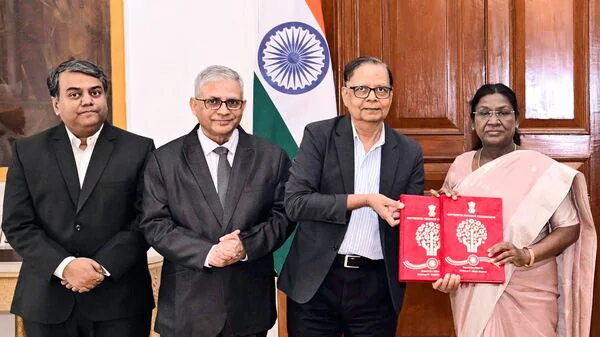
16Th Finance Commission Submits Report To President Murmu
The report, which has not yet been made public, will be tabled in Parliament before its official release. It lays out recommendations that will guide the distribution of central funds to states over the next five fiscal years, from 2026-27 to 2030-31.
To be sure, the 15th Finance Commission had recommended that states receive 41% of central taxes, a 1% reduction from the 42% share proposed by its predecessor. The adjustment accounted for the creation of the Union territories of Jammu and Kashmir and Ladakh, which are no longer classified as states for fiscal devolution purposes. That 1% was reallocated from the central divisible pool to the new Union territories.
Also Read | Finance Commission and Indian cities: A blueprint for municipal financeAccording to the finance ministry, the 16th Finance Commission is tasked under its terms of reference with making recommendations on the distribution of the net proceeds of taxes between the Union and the states, grants-in-aid, financing arrangements for disaster management, and related matters.
“During its tenure, the XVIFC (16th Finance Commission) analysed the finances of the union and states in detail and has come up with a report after wide-ranging consultations with the union government, state governments, local governments at different tiers, chairpersons and members of previous Finance Commissions, academic institutions of eminence, multi-lateral institutions, advisory council to the commission, and other domain experts,” the statement said.
The report will be published in two volumes, with the first presenting the core recommendations and the second containing detailed annexures and supporting data.
To be sure, in their submissions to the 16th Finance Commission, most states have sought a larger share of central taxes, pushing for devolution to rise from 41% to as much as 50%, arguing that increased funds are crucial to tackling poverty, financing infrastructure, and strengthening local economies.
Wealthier states, including Tamil Nadu, Maharashtra, Karnataka, Telangana, and Gujarat, have emphasized their contributions to national growth.
Also Read | India's most indebted states seek larger share of Central revenue, fiscal reliefTamil Nadu has proposed introducing a 15% weight for a state's GDP contribution while reducing the“income distance” criterion, which favours poorer states, from 45% to 35%. Maharashtra has suggested trimming it to 37.5%.
Demands have come not only from richer states. Hilly and border regions, such as Himachal Pradesh, Uttarakhand, Jammu and Kashmir, and several northeastern states, have urged the commission for greater fiscal flexibility, citing the high costs of governance in difficult terrain and recurring natural disasters.
“During consultations, states vulnerable to natural disasters urged the 16th Finance Commission to adopt targeted measures to strengthen economic resilience in high-risk areas and narrow development gaps with other states,” a person familiar with the discussions said.
“States have also urged the Commission to ease borrowing limits to give them greater flexibility,” the person said.
Under current rules, states can borrow up to 3% of their gross state domestic product (GSDP), with an additional 0.5% allowed for those meeting reform targets, especially in the power sector.
States, which have naturally disaster-prone regions, have also argued that the current limits leave them little room to rebuild or adapt to mounting climate risks, added the person mentioned above.
To be sure, recurring natural disasters, from floods in the north to cyclones along the eastern coast, have exposed the fiscal vulnerabilities of many states and underscored the need for a more climate-resilient transfer system.
Also Read | The 16th Finance Commission could catalyze climate governance in IndiaThe Sixteenth Finance Commission may have to deviate slightly from the standard parameters when computing the share of the country's revenue kitty, in line with the demands of the more developed states, Manoj Panda, a member of the 16th Finance Commission, had told Mint in an interview in July.
"A major debate that has emerged is from the developed states in western India as well as southern India, is that they are contributing more to the overall tax kitty of the country, but they are not getting adequate returns," Panda had said.
"Of course, in any federation, there has to be some give and take. The weaker states have to be supported, but developed states are saying that the low-income states can't be supported beyond a point," he added.
Legal Disclaimer:
MENAFN provides the
information “as is” without warranty of any kind. We do not accept
any responsibility or liability for the accuracy, content, images,
videos, licenses, completeness, legality, or reliability of the information
contained in this article. If you have any complaints or copyright
issues related to this article, kindly contact the provider above.


















Comments
No comment